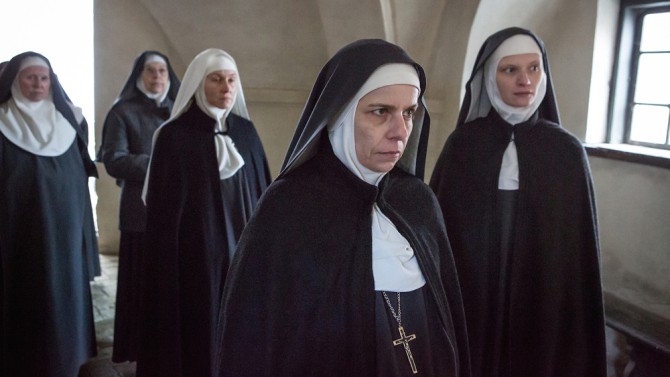Sundance 2016 Women Directors: Meet Anne Fontaine — “The Innocents”
Anne Fontaine is an actress, screenwriter and director born in Luxembourg. Her film “Dry Cleaning” won Best Screenplay at the 1997 Venice International Film Festival. Her other film, “Coco Before Chanel,” was nominated for six Cesar Awards, four BAFTA Awards, three European Film Awards and one Academy Award. (Press materials)
“The Innocents” will premiere at the 2016 Sundance Film Festival on January 26.
W&H: Please give us your description of the film playing.
AF: A French doctor — who is an atheist — finds herself helping several nuns who are pregnant as the result of an attack on their convent during WWII and their faith understandably vacillating. The film explores how tragic circumstances can bring together people motivated by seemingly opposite beliefs.
W&H: What drew you to this story?
AF: The story, a French doctor helping Polish nuns in distress at the end of WWII, is based on true events. It’s the kind of set-up that no one would have the nerve to invent!
W&H: What was the biggest challenge in making the film?
AF: The biggest challenge — working in a foreign country with a predominantly Polish cast and crew — also proved to be the biggest blessing. Being surrounded by all this change , [both] culturally [and] linguistically, was a new and refreshing inspiration.
W&H: What do you want people to think about when they are leaving the theater?
AF: In spite of all the terrible things that happen in our world, hope can — and must — prevail.
W&H: What advice do you have for other female directors?
AF: I am blessed to live and work in [France,] a country where women filmmakers are by and large not unfairly treated. So I wouldn’t have much to contribute regarding issues faced as a female director.
W&H: What’s the biggest misconception about you and your work?
AF: I don’t necessarily agree with everything I read about my films, but I wouldn’t highlight a specific misconception: If people think this or that about myself or my work, they must have their reasons.
W&H: How did you get your film funded? Share some insights into how you got the film made.
AF: There were five main sources of financing: the French distributor MG, the sales agent MG, French broadcasters (pay and free TV), European public funding and the Polish Film Institute.
It was a reasonably happy production — cold weather and monotonous food notwithstanding. The dedication and the friendship that kept the whole cast united were quite wonderful.
W&H: Name your favorite woman-directed film and why.
AF: It’s obviously nonsensical to name one and only one, but if I really have to, I’d say Jane Campion’s “An Angel at My Table.” It is so powerfully delicate and so delicately powerful. The balance is amazing!






